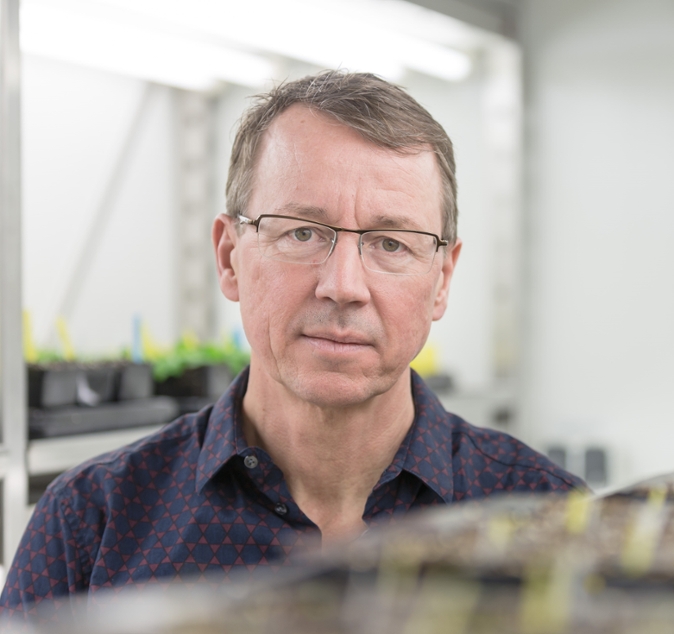Collection
Strigolactones
- Submission status
- Closed
Editors
-
Hinanit Koltai
Prof. Koltai is a Senior Research Scientist and the Director of Academic Affairs at the Agricultural Research Organization, Volcani Institute, Israel. She is a leading author of close to 100 peer-reviewed publications and more than 30 book chapters and invited reviews and she holds 15 international patents. She is a books editor and a member of various editorial boards in international scientific journals.
-
Cristina Prandi
Prof. Prandi is Full Professor of Organic Chemistry at Chemistry Department of the University of Torino where she is also Vice Rector for Research; her main interests are related to organometallic chemistry, gold catalysis and target-oriented synthesis. Prof. Prandi is leader of several national projects and chaired the Cost Action FA1206 dedicated to strigolactones. She was invited to give lectures to several scientific meetings. She is author of 119 scientific publications, seven patents, two book chapters, editor of three special issues and three books, and of 80 communications in national and international congresses.
-
Harro J. Bouwmeester
Prof. Bouwmeester is Chair of Plant Hormone Biology at the Swammerdam Institute for Life Sciences (SILS) of the University of Amsterdam, the Netherlands. The work in his group is multi-disciplinary and centered around signaling molecules and their role in the communication of plants with other organisms, such as parasitic plants, insects, nematodes and the microbiome. Prof. Bouwmeester is member of the executive committee of Terpnet, president of the International Parasitic Plant Society (IPPS), member of the American Society for Plant Biologists (ASPB), member of the National Graduate School Experimental Plant Sciences.
Articles (13 in this collection)
-
-
Stereospecificity in strigolactone biosynthesis and perception
Authors (first, second and last of 4)
- Gavin R. Flematti
- Adrian Scaffidi
- Steven M. Smith
- Content type: Review
- Published: 22 April 2016
- Pages: 1361 - 1373

-
The importance of strigolactone transport regulation for symbiotic signaling and shoot branching
Authors (first, second and last of 5)
- Lorenzo Borghi
- Guo-Wei Liu
- Enrico Martinoia
- Content type: Review
- Open Access
- Published: 04 April 2016
- Pages: 1351 - 1360

-
Structural modelling and transcriptional responses highlight a clade of PpKAI2-LIKE genes as candidate receptors for strigolactones in Physcomitrella patens
Authors (first, second and last of 7)
- Mauricio Lopez-Obando
- Caitlin E. Conn
- Sandrine Bonhomme
- Content type: Original Article
- Published: 15 March 2016
- Pages: 1441 - 1453
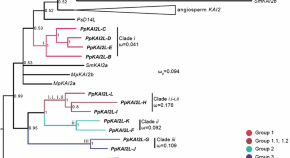
-
On the substrate specificity of the rice strigolactone biosynthesis enzyme DWARF27
Authors
- Mark Bruno
- Salim Al-Babili
- Content type: Original Article
- Published: 05 March 2016
- Pages: 1429 - 1440

-
Expression of MAX2 under SCARECROW promoter enhances the strigolactone/MAX2 dependent response of Arabidopsis roots to low-phosphate conditions
Authors (first, second and last of 15)
- Ortal Madmon
- Moran Mazuz
- Hinanit Koltai
- Content type: Original Article
- Published: 26 February 2016
- Pages: 1419 - 1427

-
Strigolactone versus gibberellin signaling: reemerging concepts?
Authors
- Eva-Sophie Wallner
- Vadir López-Salmerón
- Thomas Greb
- Content type: Review
- Open Access
- Published: 22 February 2016
- Pages: 1339 - 1350

-
The Whats, the Wheres and the Hows of strigolactone action in the roots
Authors (first, second and last of 7)
- Cedrick Matthys
- Alan Walton
- Sofie Goormachtig
- Content type: Review
- Published: 19 February 2016
- Pages: 1327 - 1337

-
ZmCCD7/ZpCCD7 encodes a carotenoid cleavage dioxygenase mediating shoot branching
Authors (first, second and last of 5)
- Xiaoying Pan
- Hongyan Zheng
- Xuexian Li
- Content type: Original Article
- Published: 19 February 2016
- Pages: 1407 - 1418
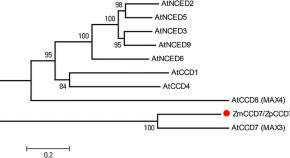
-
Strigolactones: new plant hormones in action
Authors
- Binne Zwanenburg
- Tomáš Pospíšil
- Sanja Ćavar Zeljković
- Content type: Review
- Open Access
- Published: 02 February 2016
- Pages: 1311 - 1326
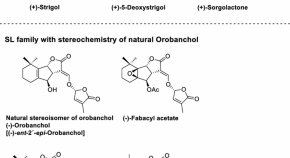
-
Functional redundancy in the control of seedling growth by the karrikin signaling pathway
Authors
- John P. Stanga
- Nicholas Morffy
- David C. Nelson
- Content type: Original Article
- Published: 11 January 2016
- Pages: 1397 - 1406

-
The role of strigolactones during plant interactions with the pathogenic fungus Fusarium oxysporum
Authors (first, second and last of 5)
- Eloise Foo
- Sara N. Blake
- James B. Reid
- Content type: Original Article
- Published: 02 January 2016
- Pages: 1387 - 1396
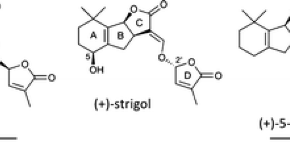
-
How drought and salinity affect arbuscular mycorrhizal symbiosis and strigolactone biosynthesis?
Authors
- Juan A. López-Ráez
- Content type: Review
- Published: 01 December 2015
- Pages: 1375 - 1385




